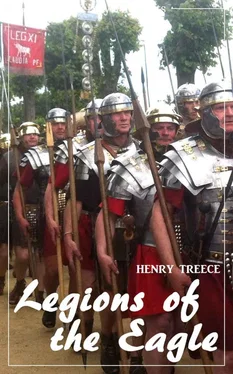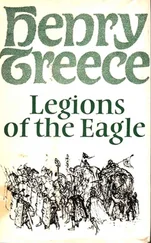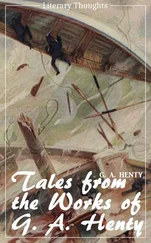Gwydion shrank back. "My father was laughing at them last night," he said. "But these men are not like those he was describing."
Math said, "Begging your pardon, Gwydion, you Belgae are all the same. You laugh because you wish to make a good impression, not because there is anything to laugh at!"
Gwydion gave him a stern look, but that did not prevent Math from grinning, all the same.
"These must be scouts, come in advance to spy out the land," said Gwydion. "They may have been about here for days, for all we know. Why, we might even have run into them when we were hunting yesterday. It is a frightening thought. I wonder what they would do, if they caught a boy?"
Math smiled wryly. "I have never heard that the Romans were famous for their gentleness," he said. "They are soldiers, and have no thought in their shaven heads but for fighting and looting. If they caught you, my dear friend, they would just strip the gold ornaments from your neck and arms and then..." And Math made the same gesture which the guard at Camulodunum had made the night before. Somehow, it seemed more horrible when Math made it, and Gwydion turned away.
Just then, Bel gave a whimper and broke from his master's hands. The dog had almost run into the hollow when he saw the strangers and turned back to the boys.
"Come on!" said Math, already on his feet. "They have seen Bel and they will know someone is near. Look, they are coming up the slope!" There was no time to lose; the boys ran as fast as they could, and had just fallen into a fern-hung ditch as the first Roman javelin appeared over the top of the hollow. Covered with fernfronds, they lay still, Bel clasped securely this time, with Gwydion's hand round his muzzle, shivering with excitement.
At last, on either side of them, they heard the sound of heavy footsteps, and heard men swearing in some rough Roman dialect. Gwydion knew that they were wondering who might have been with the dog, and where it could have got to. Then he heard something which sent his blood cold. The leader of the scouting party had said, "What if they are in this ditch? Give it a prod, you men. We'll soon see!" Then the boys heard the sound of those cruel javelin points thrusting through the fern fronds, coming down the ditch on either side, towards them. Gwydion actually felt the dry leaves shake a little to his side as the bright knife-edge cut through them. Then suddenly the thrusts stopped, when they were but a foot from the boys; and away from the distant hill came the long blasts on the war-horns that Caswallawn had told his son to listen for. The Romans paused and listened, then they spoke to each other hurriedly, and began to move away a little, debating what they should do. One man was for making a more thorough search of the hill; the others were all for probing the length of the ditch again, on the chance that they had missed their quarry in their first search.
The boys lay still, almost choking in their efforts to be quiet under their layer of grass and fern fronds. The horn sounded again; that would be the final warning, Gwydion knew. The wagon would be leaving now, without them. Yet the Romans were still talking above them, and the boys knew well enough that these were men without mercy; not the sort to take pity on anyone, much less the children of the enemy they had come so far to destroy.
It seemed like an eternity before the Romans concluded their argument and went a little distance away, to sit down and wait, for from what Gwydion could make out, they intended to hold their position on the hill until the cohorts had moved very much nearer; and then they would go down the hillside to meet them.
Gwydion reached through the bracken and clasped Math's hand, as though reassuring the slave that they must stay there and think of a plan afterwards.
Then Bel began to struggle again and Gwydion's energies were well occupied in keeping the dog still. He almost took out his heavy sling-shot, in desperation, to stun the dog, for he felt that even this might be better than all of them meeting a certain death. But luckily Bel became still again and Gwydion's hand moved away from his belt.
Gradually the sun climbed overhead and began to burn down into the ditch. The boys became almost unbearably thirsty. Then the soldiers began to whistle softly, and even to sing in low voices—songs which were not in Latin at all, but in a number of languages and dialects. In fact, the languages of the various countries in which these tough soldiers had marched during their many hard years under the Eagles. And some of the choruses sounded so inviting that once Math almost forgot himself and began to join in. Gwydion heard the sound start in his throat and wondered whether this would be the signal for the Romans to throw a spear or two into the ditch to make sure that no-one was hiding there. Yet even through his fear he sensed the power, the arrogance of Rome, that her soldiers should dare sing her songs while out surveying in unexplored enemy territory. These Romans were brave men, whatever else one said against them, thought Gwydion.
Then at last, perhaps an hour later, or even more, a new sound came floating up the hill to the tense ears of the hidden boys; a low whispering rhythmic sound, a shuffling sound that at last resolved itself into a definite beat, a marching beat. It was the sound that had struck fear into half the world, the sound of an approaching Roman army. Mingled with this frightening sound of feet came the many other sounds of a moving army; the neighing of horses, the shouts of officers, the clash of arms and armour and the thin high screaming of the terrible Roman trumpets.
Even Gwydion felt his pulses race as he heard this strange intoxicating sound. This was what his father would hear soon; this was the last sound that many brave men, on both sides, would hear before that fateful day was out.
Then suddenly the Romans on the slope above them began to shout and cheer, and call out their regimental war-cries. Then the boys heard the thudding of their footsteps and their spears rattling against their shields as they ran, and they knew that their pursuers were gone.
The lads waited for a while, and then slowly raised their heads above the ditch. No one was in sight, and a rise in the hillside blotted out their view of the plain below. They could not see the Roman army.
At last Gwydion whispered, "It would not take us long to catch the wagon up, for they will go slowly, expecting us to follow. It seems a great shame to be so near a real battle, and not to see what it looks like? Shall we go down and see what is happening? Are you willing, Math?"
The dark slave nodded his head. "But do not hold me responsible, Gwydion," he said. "It is your idea, not mine."
"Very well," said the Belgic boy, "I will take the blame. Come on, we must keep our heads down, I don't know quite where the soldiers are. They sounded close, but with as many men as that, the sound of their feet would be bound to sound near, even though they were a mile away."
And so the two boys made their way down the hill in order to witness the battle of Camulodunum, and the invasion of Britain by the great general, Aulus Plautius, with almost sixty-thousand men; though they were not aware of this; nor would it have meant a great deal to them had they been aware.
CHAPTER 5 – HA! AMONG THE TRUMPETS!
Under the summer sun that day the fate of a country was to be decided, and the two boys, watching from a hillock over half a mile away from the conflict, gazed with set faces, their hearts beating with excitement. Even Bel was caught up in this frenzied atmosphere and, as trumpets blew from the Roman side and the long war-horns howled from the Celtic side, the small hound leapt on his thong-lead with an excitement as pronounced as that of his young master, whining and scratching the springy turf, as he tried to break away and run from this immense turmoil which now seemed to approach and now retreat from the watchers on the hill. Down there it seemed that half the world had assembled to do battle, for the plain was now dark with a multitude of men.
Читать дальше












